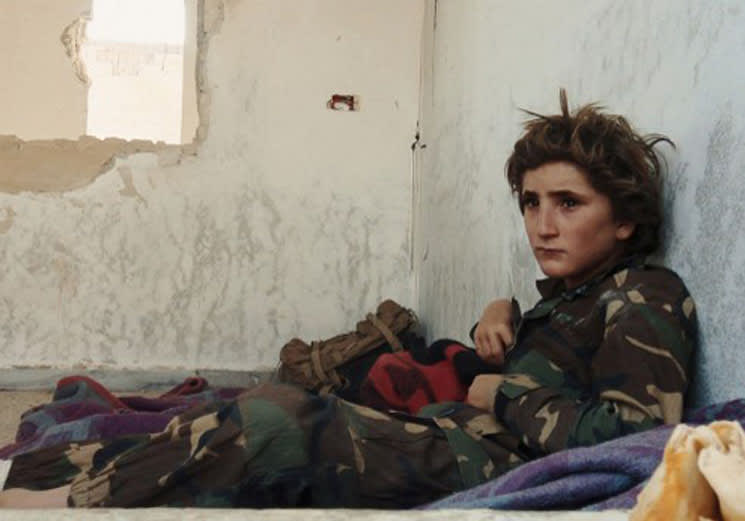When filmmaker Talal Derki journeys back to his homeland of northern Syria with a camera in tow, he finds an unrecognizable land ravaged by destruction. Posing as a jihadist sympathizer, he embeds himself within the family of an Islamist radical in Of Fathers and Sons, and captures remarkable footage of their day-to-day lives. He emerges with an indelible lesson in how ideologies are passed down from generation to generation and a bleak snapshot of an interminable war.
Abu Osama lives in a modest space with a whole brood of young boys, ranging from infants to budding teenagers. In introducing them, he cheerfully explains how he named several of them, including Osama, after prominent figures surrounding 9/11. He's often out scanning for mines as part of the Al-Qaeda-affiliated Al-Nusra Front, as he disassembles them for their parts, and on one occasion, we even find him in a foxhole firing a gun at a man on a motorbike. He also spends his idle time singing songs about laying waste to all of his group's opponents and dreams of establishing an Islamist caliphate.
Though he is given his share of screen time, it's his children who really provide the film's focal point. The camera keenly observes their innocence being slowly eroded by their surrounding environment, as they play amongst burnt-out tanks and frequently engage in fights that establish a pecking order. There are scenes of domestic bliss punctured suddenly by harsh realities, as when they briefly take a bird as a pet and one small child asks out of nowhere if it will be beheaded like his father had done to a man.
Often left to their own devices while their father is away, they engage in some activities, like soccer, that you would expect from children, but also put an extensive knowledge of how to make homemade bombs to use. Among the children, Osama and Ayman stand out from the pack by virtue of their contrasting personalities. Osama has the focus and determination of a warrior, just like his father desires, while Ayman excels in school but disappoints his father by not taking to the combat training he arranges.
Set against the backdrop of perpetually smoky skies and the faint din of gunfire, Derki's searing images cast the war in a more intimate light. You're left with the sense that this is only a small piece of a bigger picture, one family of many that will continue to fight for their beliefs until they have all been martyred, as Abu regularly refers to others who have been killed for the cause. At 13 and 12 respectively, it won't be too long before Osama and Ayman are having their own children and another generation will be born into a conflict that will quickly claim their innocence as yet another casualty.
(Basis Berlin Filmproduktion)Abu Osama lives in a modest space with a whole brood of young boys, ranging from infants to budding teenagers. In introducing them, he cheerfully explains how he named several of them, including Osama, after prominent figures surrounding 9/11. He's often out scanning for mines as part of the Al-Qaeda-affiliated Al-Nusra Front, as he disassembles them for their parts, and on one occasion, we even find him in a foxhole firing a gun at a man on a motorbike. He also spends his idle time singing songs about laying waste to all of his group's opponents and dreams of establishing an Islamist caliphate.
Though he is given his share of screen time, it's his children who really provide the film's focal point. The camera keenly observes their innocence being slowly eroded by their surrounding environment, as they play amongst burnt-out tanks and frequently engage in fights that establish a pecking order. There are scenes of domestic bliss punctured suddenly by harsh realities, as when they briefly take a bird as a pet and one small child asks out of nowhere if it will be beheaded like his father had done to a man.
Often left to their own devices while their father is away, they engage in some activities, like soccer, that you would expect from children, but also put an extensive knowledge of how to make homemade bombs to use. Among the children, Osama and Ayman stand out from the pack by virtue of their contrasting personalities. Osama has the focus and determination of a warrior, just like his father desires, while Ayman excels in school but disappoints his father by not taking to the combat training he arranges.
Set against the backdrop of perpetually smoky skies and the faint din of gunfire, Derki's searing images cast the war in a more intimate light. You're left with the sense that this is only a small piece of a bigger picture, one family of many that will continue to fight for their beliefs until they have all been martyred, as Abu regularly refers to others who have been killed for the cause. At 13 and 12 respectively, it won't be too long before Osama and Ayman are having their own children and another generation will be born into a conflict that will quickly claim their innocence as yet another casualty.




